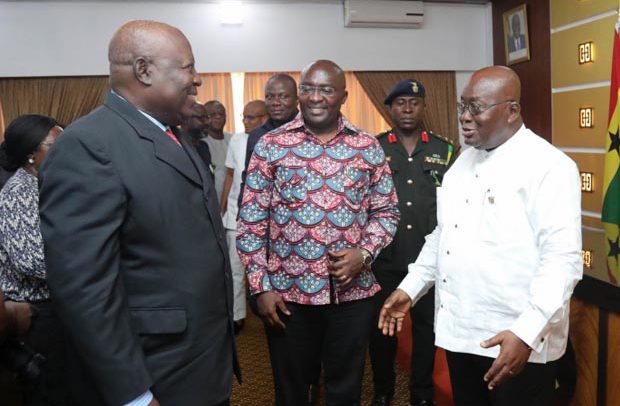President Akufo-Addo, Vice President Bawumia and Martin Amidu
President Akufo-Addo’s nomination of Martin Alamisi Amidu as the maiden Special Prosecutor is spot on. It is the most outstanding proof yet of a president’s resolve to fight corruption in post-independence Ghana.
His predecessor only constantly used the subject as a footnote in broader discussions of governance with little or no tangible evidence of walking his talk.
In a sarcastic bid to douse the reality of the quantum of graft in the country, he is reported to have asked those with evidence of corruption to provide same for the necessary action. It was a disingenuous response to the many corruption allegations leveled against his appointees.
Under former President Kufuor, some prominent politicians were jailed for causing financial loss to the state – euphemism somewhat for corruption.
It is undeniable that his nomination was one of those difficult decisions the President had to take. Such moments occur sometimes in the lives of politicians of fame decisions which impact immensely in the history of a country. Politicians who damn the consequences and plunge into the unknown but convinced that the move is in the best interest of the nation, would have at the end of their tenure inscribed their names in the marble of the history of the nation.
When the history of the war against corruption in Ghana comes to be chronicled one day, President Akufo-Addo would straddle the chapter.
No factor can account for President Akufo-Addo’s choice of a man who is principled and would go the extra mile to deal with corruption head-on with no room for interference from any quarter regardless of whose ox is gored; that is an obsession to rid the country of the canker.
Martin’s steadfastness, albeit sometimes bereft of an occasional finesse, during his vetting said it all about the man whose name sends apprehension down the spines of the corrupt.
We found his position that it is unfair to see only politicians as corrupt as the truth which has been ignored for far too long. Indeed the role of civil and public servants in perpetuating corruption in governance should not continue to be ignored.
Directors and chief directors have been noted to be serving as conduits and sometimes conductors of corruption. They introduce politicians to the loopholes to corruption yet they are hardly heard. Such bad nuts, it is certain, would have to revise their notes lest they are caught in the net of the man who is averse to corruption.
Indeed when the investigations into the myriad corruption cases in the country commence, it would be interesting to find out how much such civil and public servants contributed to the seepages and leakages of the public purse.
The war has just begun. There is no turning back.


